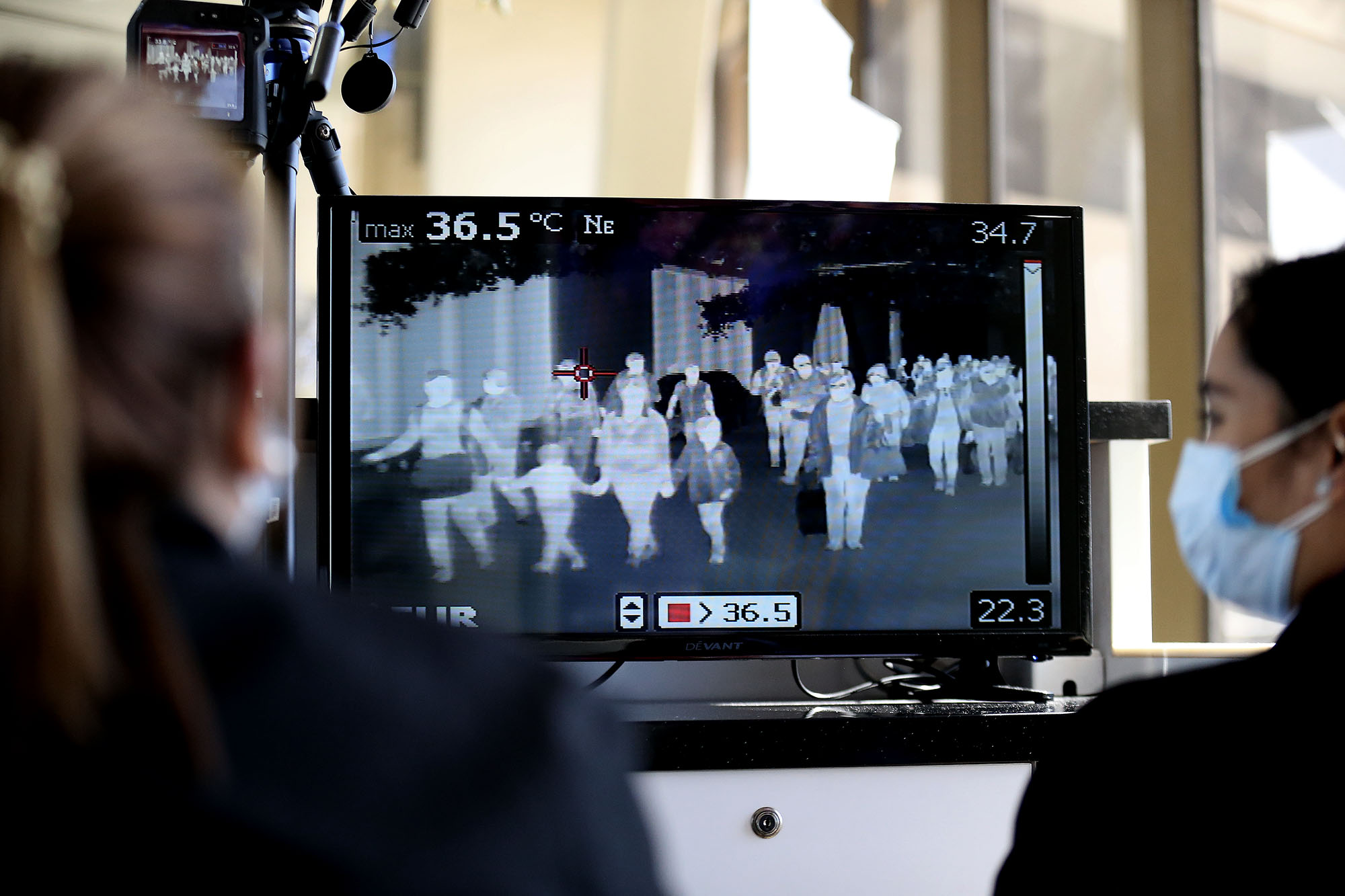DOH eases public fears: ‘Death not automatic’

HIGH ALERT Passengers arriving at Ninoy Aquino International Airport in Pasay City are monitored for fever using a thermal scanner on Wednesday. The country is on high alert following the outbreak of a newstrain of coronavirus that has infected hundreds of people and killed at least nine in China. —RICHARD A. REYES
Health authorities on Wednesday said they still have much to learn about the new coronavirus that has already killed at least nine people in China but allayed fears that an automatic “death sentence” would fall on those who had been infected.
The virus, which originated in Wuhan city in Hubei province late last year, has infected more than 440 people in China.
Infections have also been reported in the United States, Thailand, South Korea, Japan and Taiwan.
Chinese health officials said there was evidence of “respiratory transmission” of the virus—technically called the 2019 Novel Coronavirus (2019-n-CoV).
Still many blind spots
“Let me just underscore that there are still many blind spots with regard to the novel coronavirus and the information stream continues,” Health Secretary Francisco Duque III said at a press forum in Manila.
“This is not a death sentence. This will be a death sentence only when a person who has a severe disease or preexisting conditions like cancer catches the virus, because chemotherapy will cause a weak immune system,” he said. “That’s why even if coronavirus is mild, it can cause severe complications.”
He added that the elderly and children might be more vulnerable to the 2019-n-CoV.
The Department of Health (DOH) is in constant touch with the World Health Organization (WHO) for definitive updates regarding the virus.
No confirmed PH case
There is still no confirmed case of the 2019-n-CoV infection reaching the Philippines, although a 5-year-old boy who was already sick when arrived in Cebu City from Wuhan was under close observation and isolation, along with his mother.
Three other Chinese nationals with flu-like symptoms who had arrived over the past two weeks in Kalibo, Aklan, on their way to Boracay had been cleared.
“The child is already well—just a little cough, no longer feverish,” Duque said. “The mother of the child did not show any symptom. That’s why there is still a possibility that this is not really novel coronavirus.”
The DOH is waiting for test results from the Victorian Infectious Diseases References Laboratory in Melbourne, Australia, to determine whether the child was infected with the 2019-n-CoV.
Duque earlier said the boy had tested positive for “nonspecific pancorona virus” at the Research Institute for Tropical Medicine (RITM) although the boy was negative for SARS and the Middle East Respiratory Syndrome-CoV (MERS-CoV)—two of the six known strains of the coronavirus.
“There is a possibility that this novel coronavirus might be one of the four (other strains)—pending precise identification—but it could be the seventh coronavirus and that is why they are referring to it as ‘novel’,” he added.
12 monitored in Cebu
In Cebu City, the DOH regional director said 12 people who had physical contact with the Chinese boy since he arrived on Jan. 12 were being monitored by health authorities.
They included some health workers and people who were in the hospital. The health official, Jaime Bernadas, did not name them.Bernadas said the thermal scanners at the Mactan International Airport detected that the boy had fever and both he and his mother were immediately placed in isolation. Both now want to return to China, but health authorities said they must wait for the Australian laboratory test results.
Bonnie Bungag, public affairs chief of Manila International Airport Authority, on Wednesday said his office was providing support to the Bureau of Quarantine (BoQ) in preventing the entry of the virus through the Ninoy Aquino International Airport (Naia).
Naia measures
At Naia Terminal 1, all arriving passengers are being monitored by BoQ nurses using thermal scanners, which were last used during the 2018 MERS-CoV outbreak.
Thermal scanners emit an alert if any passing passenger registers a temperature of 36.5 degrees Celsius or higher. The passenger will be isolated and his or her temperature taken again by a handheld scanner, undergo a medical examination and his or her travel history scrutinized.
If the passenger is confirmed to have fever, displays respiratory symptoms, and there is strong suspicion of infection, the passenger would be taken to the RITM, said Lotis de Guzman, BoQ medical officer.
Jim Sydiongco, director general of the Civil Aviation Authority of the Philippines (Caap), ordered the reactivation of the communicable disease preparedness procedures, especially at Kalibo International Airport, which has direct flights from Wuhan and other Chinese cities.
Public advisories
Caap operates the six other international airports at Puerto Princesa, General Santos, Zamboanga, Davao, Laoag and Iloilo, and manages 35 domestic airports.
Public advisories about the virus had been posted at passenger terminals and airport frontline personnel have been advised to wear masks, maintain maintain proper hygiene and wash their hands regularly, said its spokesperson, Eric Apolonio.
Representatives of airport security committees, local governments and concerned agencies have been called to meetings to discuss preventive measures and what to do in the event the virus is detected, Apolonio said. INQ –WITH REPORTS FROM DALE G. ISRAEL AND JEROME ANING
For more news about the novel coronavirus click here.
What you need to know about Coronavirus.
For more information on COVID-19, call the DOH Hotline: (02) 86517800 local 1149/1150.
The Inquirer Foundation supports our healthcare frontliners and is still accepting cash donations to be deposited at Banco de Oro (BDO) current account #007960018860 or donate through PayMaya using this link.